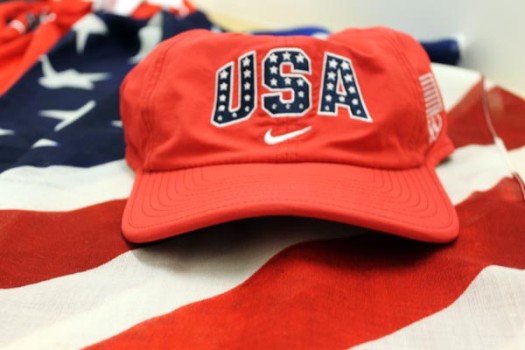What to expect: Winter Olympic games

Dick’s Sporting Goods in Flower Mound promotes the 2014 Winter Olympics with different kinds of apparel.
On February 7, spectators worldwide will tune in to watch the elite face harsh winter weather in order to compete for the gold in Sochi, Russia. The 22nd Winter Olympics will be the first Olympics the Russian Federation has hosted since the dissolution of the Soviet Union in 1991. With a record 98 events, the games will be focused around two sections of venues. The newly built Olympic Park Coastal Cluster near the Black Sea will play host to the main Olympic village, the International broadcasting centre and the Fisht Olympic Stadium (where the opening and closing ceremonies will be held). Additionally, the Krasnaya Polyana mountain cluster will be the location of events like cross-country skiing, snowboarding, and ski jump.
Preparing the facilities and the city for the games has taken much preparation and planning. To accommodate for the large numbers of media personnel, athletes and spectators, Sochi had to remodel their infrastructure. Modernized media and technological means, electric power supply and transportation designs are all apart of the federal target program.
This transformation doesn’t come without a cost. The estimated cost for the Olympic games has exceeded US $51 billion as of last October. If this estimate cost comes to pass, the budget will make the Sochi games the most expensive Olympics ever, beating the 2008 Beijing Olympics estimated cost of US$44 billion. Originally, the organizers estimated the cost being US$12 billion, which was already exceeding Vancouver’s cost of US $8 billion.
“Most Expensive Games Yet” isn’t the only title being claimed by the Sochi Games. According to President Vladimir Putin, the Sochi games will be the safest games in Olympic history. Due to a large number of Islamic militant group threats of violence at the games, security has been significantly tightened. American athletes are encouraged to not wear their uniforms or anything conspicuously supporting the US outside of the Olympic circle. No outside liquids are allowed inside the venues. While the Russian government and Sochi organizers are intent on proving that they can host a safe Winter Olympics, the terrorist groups seem equally intent on proving that they mean what they say. Pamphlets instructing people to watch for Muslim women suspected to be suicide bombers known as “black widows” were passed around Sochi recently when it appeared one of these women may have infiltrated the venues.
While the groups may have disturbed the games somewhat, the Olympic spirit has rekindled through one of the most extravagant torch relays the Olympics have seen in a while. The flame has touched the stars, hitched a ride on the subway, and even hit the books. Over the course of its 123 day journey, the torch achieved many accomplishments. In November, it went to the International Space Station. It also rode the Moscow subway and it visited a secondary school. The relay touched Russian city after Russian city and was seen by nearly 90% of the Russian population.
With a dozen new events, record breaking expenses and a renovated city, the 2014 Winter Olympics will be an event to remember.

Twitter: @rdr719











